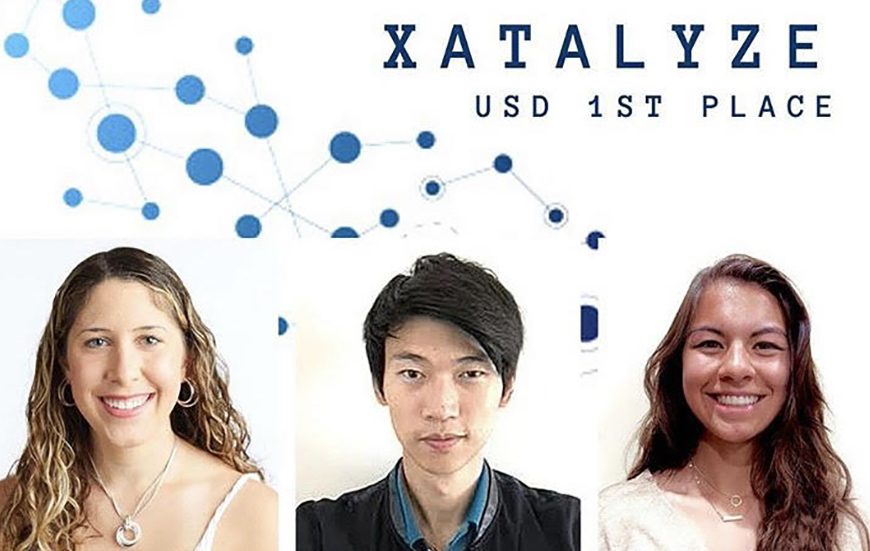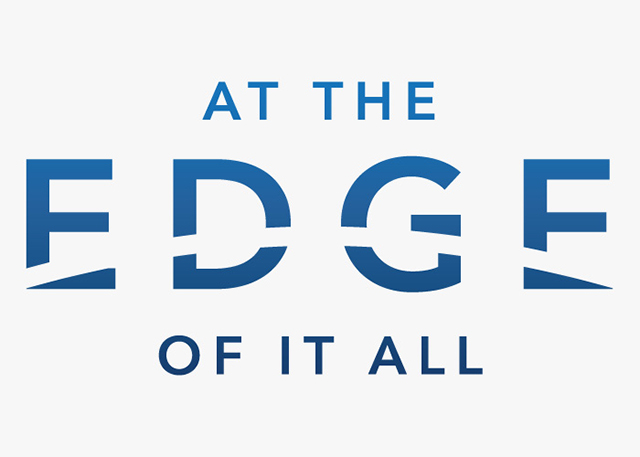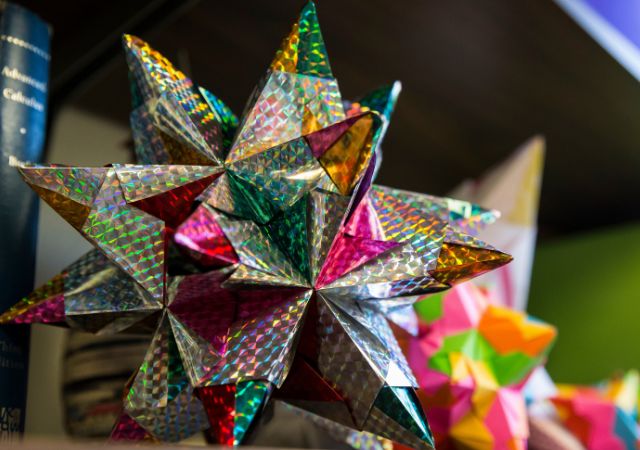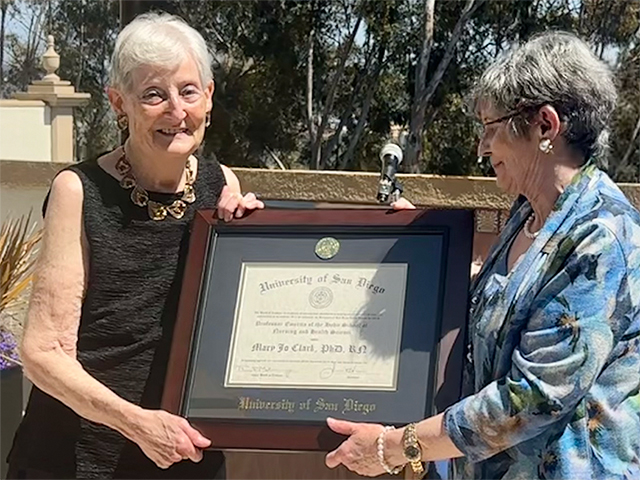USD's Xatalyze Focuses on Affordable Renewable Energy for All
 Xatalyze, a USD finalist competing in the Fowler Global Social Innovation Challenge is, from left to right: Rylee Bers, Jarvis Lu and Kyla Knauf.
Xatalyze, a USD finalist competing in the Fowler Global Social Innovation Challenge is, from left to right: Rylee Bers, Jarvis Lu and Kyla Knauf.Jarvis Lu's initial interest in learning about the future — not in a fortune teller kind of way, but an approach to an environmentally better world — came when a high school physics teacher shared his thoughts about the world's future energy sources and how it could be stored and renewed.
"He spoke about the future of energy sources using capacitors," Lu said. "There are technology barricades to overcome, but it was a different route to take. It could replace batteries and turn capacitors into an accelerator for renewable energy."
When Lu arrived at the University of San Diego and its Shiley-Marcos School of Engineering, his interest was still strong. Majoring in integrated engineering with an emphasis on embedded software, Lu kept his concept at bay until this past year.
While speaking with USD assistant professor Diana Chen, the third-year student's thoughts about capacitors as a large-scale energy storage source gave Chen the impetus to suggest Lu should enter the Fowler Global Social Innovation Challenge. The event seeks projects that tied to one or more of the United Nations' 17 Sustainable Development Goals. He listened and did enter, under the name of Xatalyze.
Lu soon learned that his idea was missing something and he needed help. Enter Kyla Knauf, a third-year biology major and environmental studies minor with a social justice focus, and Rylee Bers, a second-year computer science major and environmental science minor.
"I recruited both of them because I was coming at it from an entirely engineering perspective. I realized when I spoke to people, it was with just an engineering mindset. I had not translated it to the real world. There would be unforeseen consequences. I needed someone who could help me take this project farther and keep me on track with its environmental benefits," he said.
When Knauf and Bers listened to his project and saw its potential, they got involved.
"I was excited because studying both computer science and environmental science, I really do want a career that combines these disciplines," Bers said. "I think this project does exactly what I want in a career so I thought it was a really good opportunity to use my technical skills for something that can benefit the environment."
Added Knauf: "Two of my career goals are to support environmental conservation and increase awareness and availability of environmental practices to the general public. Xatalyze accomplishes both of these, which made it an easy decision to get involved. I was intrigued by the technology Jarvis presented and knew immediately I wanted to help make it as green and as successful as possible."
In a video it created for the Fowler Global SIC's USD Finals in late April, Xatalyze spoke about a patented converter to allow energy stored in capacitors to bring renewable energy into households at an affordable price. Based on projections, the group believes this system, made from 100 percent recycled aluminum, could save the average household up to $1,300 a year.
"To me, what's most important is to completely remove the need for fossil fuels for energy generation," Bers said. "I think that’s going to be a bigger issue as time goes on and we run out of these resources."
Knauf sees Xatalyze as a great opportunity for renewable energy to be accessible for all. "With this innovation, we could actually make it more affordable and, even if a person's priority isn't about being environmentally friendly, they are still contributing."
Lu agrees with Knauf, and takes it another step. "We can provide a tangible benefit through this energy surge that can, perhaps, change their perspective about renewable energy."
Xatalyze's idea got the full attention of judges for the USD Finals. The trio earned one of two USD team entries for this week's march to the global finale where teams from 28 universities, 15 countries and nine time zones seek a share of $58,000 in seed funding and prizes. The Fowler Global Social Innovation Challenge final will be broadcast virtually on YouTube at 5 p.m. on Saturday, June 13. Register now for this free event for exclusive access to the live show.
Teams are presenting their ideas by video to judges, followed by a live Q&A, this week. Twelve finalist teams will be determined by Friday. Saturday's live event will include a 90-second video clip from each finalist.
Lu, Bers and Knauf have certainly put in the effort for this competition. Bers and Knauf, who both live in Chicago, and Lu, based in San Diego, take this seriously. They have worked around distractions and distance caused by the Covid-19 pandemic and USD's switch to remote learning. They were among 15 USD finalists, pocketed $3,500 in funding at the USD Finals. But they said in an interview last weekend that they’ve since changed the look, tone and feel of their video for judges this week.
Xatalyze has a talented, yet grounded, group. Each one learned about the GSIC competition at the beginning of the spring semester. Bers wasn't even a team member until after the Covid-19 shift of USD students off campus started. Knauf was on it just prior to the shift. Lu will continue with Xatalyze next year as his senior design engineering capstone project. All three students believe the biggest aspect of the GSIC isn't so much the seed funding or necessarily other quality resources afforded them by the event organizer, USD's Center for Peace and Commerce.
Having the chance to work on a project from a new perspective, a new view — in front — holds greater appeal.
"This is a very unique experience," Knauf said. "I've done three internships and had a few research positions. I've done a lot of learning, but for most of them I’ve been underneath somebody else — a mentor or a supervisor and I'm at their will as to what I get to do. Here, I'm on a team and we are equally working toward a goal. It's really cool having this type of leadership opportunity for the first time."
Lu agrees. "The (GSIC) money available is nice, of course, but the experience itself is something you can't get from your classes. In this competition, it's about presenting our idea the way we see it. Here's what we think. We have to figure it out. I think students don't get enough exposure to that."
This is the third year of the global final and 10th year overall for the Social Innovation Challenge concept at USD. Xatalyze is one of many teams with an idea to make a difference in the world and to make it better — for everyone's future.
— Ryan T. Blystone
Contact:
USD News Center
news@sandiego.edu
(619) 260-4681



